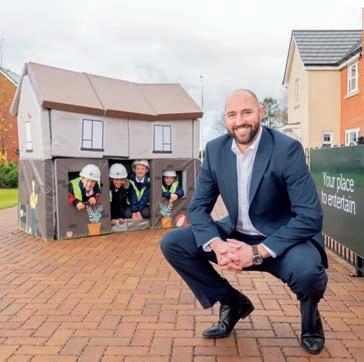
4 minute read
Orbit Homes recruits primary school ‘building buddies’
Primary school children will get an insight into how homes are built as part of a new educational programme being launched by Orbit Homes.
‘Building Buddies’ is aimed at children aged seven to 11 (Key Stage Two) and will see local schools being invited to experience a hands-on site visit, where children
Advertisement
Applications for the CIOB Construction Innovation and Quality Scholarship are now open. The scholarship is designed to provide a professional development opportunity for those working towards a career in construction management. It is aimed at sector professionals working anywhere in the world and is an opportunity for academics, undergraduates or can develop their knowledge and skills by safely exploring the site, speaking to the development team, learning the importance of health and safety, and discovering how brand-new houses are constructed. There will also be an opportunity for the children to build a home of their own, with a special 3D model house which teaches young Building Buddies the build stages of a new home.
Ray Winney MCIOB, construction director at Orbit Homes, said the educational programme aims for children to discover housebuilding and how exciting it can be.

“We want to show young people that anyone can work in the construction industry – in jobs varying from design and planning, to site management and bricklaying. The children will be able to build a 3D house, learn about the stages of construction and get an insight into the job roles within the building sector.
“It is our hope that this new initiative helps involve local people in our developments, as well as offer children a unique learning opportunity.” postgraduates currently studying at a CIOB-accredited HEI and FE institution.
Classroom resources, which include worksheets for all KS2 pupils as well as a supporting teachers pack, are available for teachers to download from the Orbit Homes website. ● For more information, contact: building.buddies@orbit.org.uk.
Applicants who are working full-time, part-time or are in between employment are eligible to apply. Applicants must be a CIOB member but any membership grade will be accepted.
During the programme, scholars will be required to complete a research project with a definable, published output that is relevant to the industry.
Applications will close on 30 June. Panel interviews for those shortlisted will be in July, date to be confirmed. For full details and how to apply visit www. ciob.org/learning/scholarships/ construction-innovation-andquality-scholarship.
Student Festival delivers knowledge and confidence
Two-day virtual event in March offers value to student members

New CIOB guide to safety-critical building issues
Simon Pitchers sets out procedure for identifying risky elements
CIOB’s Student Festival, now in its third year, will take place on 8-9 March 2023.
The two-day event will take place in one virtual space for all CIOB student members around the globe. The purpose is to inspire, inform and celebrate CIOB student members, who can expect to take away meaningful messages from a diverse community of CIOB members.
This will allow them to benefit from technical and practical insights, professional views and personal wisdom for their future careers.
The festival will include: l industry leaders – thoughts and opinions from leaders in the sector; l global careers – a spotlight on career perspectives from global organisations in all areas of construction; l learning essentials – student takeaways from dissertation tips to finding your next job; l Tomorrow’s Leaders – views from our early career and future leaders; and l networking – making new professional contacts worldwide.
Tomorrow’s Leaders champion Giovanni Bortolin, a master’s student at UCL, attended last year’s festival as an undergraduate. “This was a fantastic experience. It was nice to see many like-minded student members with a passion for the built environment and interesting to hear the opinion of industry professionals on the role of graduates and students in the industry,” he said. “As I was in the last year of my bachelor’s degree, I found really useful tips for my dissertation too.
“The festival also offers the opportunity to have a Q&A with the speakers. I was pretty interested in the questions raised by other students and the well-answered reflections the speakers gave.
“I would highly suggest to other students to participate in the CIOB Student Festival 2023 to feel more motivated and passionate about the possibilities in the industry at the end of their studies. Also, the knowledge obtained can help students to make more informed decisions and to enrich their current studies.” l Register now at www.ciob.org.
CIOB has issued a new guide to help identify safety-critical issues.
The guide enables users to identify safety-critical elements that if omitted or installed incorrectly, could lead to failures that have the potential to result in loss of life. It also outlines systems that should be in place to ensure that such safety-critical elements are properly incorporated in the building.
Simon Pitchers, co-owner of structural engineering and design consultancy Craddys and a regular on TV and radio shows as a ‘building fails’ expert, is the author.
He said: “It’s a practical short, simple guide for everyone involved in building, full of examples and avoiding management-speak. You can read the main body in 12 minutes and then be able to identify a safetycritical element and how to take the right level of care when you build it. It’s a small document – but we think it’s quite a big step towards industry culture change.”
The guide, jointly initiated by the CIOB and RIBA, has been produced with the intention of increasing awareness across all sections of the industry of the need to bring a rigorous and structured approach to the design, construction and inspection of elements identified as potentially safety-critical.
It focuses on elements frequently found to be defective and carry a high risk to building users. Its foreword says: “By successfully addressing these systemic issues, the industry would be taking a major step forward in both ensuring the safety of users in the buildings we produce and in restoring public confidence in our industry, an industry in which we can then all justifiably be proud to work.”








